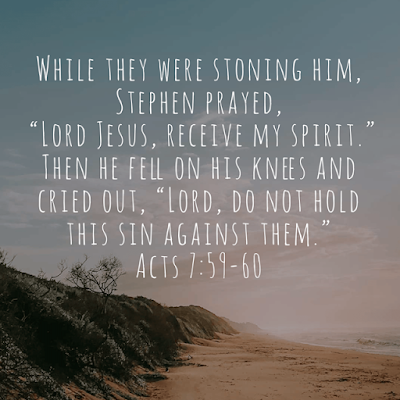The Legacy of Stephen, the First Martyr
“As they stoned him, Stephen prayed, ‘Lord Jesus, receive my spirit.’
He fell to his knees, shouting,
‘Lord, don’t charge them with this sin!’
And with that, he died.”
Acts 7:59–60
The Church’s first martyr was not an apostle or theologian, but a man appointed to serve tables. Stephen, chosen to help distribute food in the early church, reminds us that true faithfulness begins not in the spotlight, but in the shadows—where character is shaped, not showcased. Around the world, the gospel has most often taken root in places prepared by the blood of martyrs. But before someone can die for Christ, they must first live for Him.
In the early Church, following Jesus came at a cost. Believers—especially Jewish converts—were often cut off from their families and livelihoods. Community became their refuge. Homes, meals, and resources were shared freely, not as a luxury, but as a necessity. When complaints arose about the fair distribution of food, the apostles sought leaders “known to be full of the Spirit and wisdom” (Acts 6:3). Stephen was among them.
Yet Stephen was more than a good administrator—he was a man of profound spiritual authority. When opposition came, he responded not with defensiveness but with clarity. His speech before the Sanhedrin was not a legal defense, but a prophetic indictment. He traced Israel’s history and called out their repeated rejection of God’s messengers. He knew the cost of such truth-telling—and embraced it.
At the climax of his speech, Stephen “looked up to heaven and saw the glory of God, and Jesus standing at the right hand of God” (Acts 7:55). In that moment, the risen Christ stood to welcome His servant. Stephen prayed for his executioners, and in doing so, bore the image of Christ to the end.
Dallas Willard observed, “Saints burn through the fog of this world by living in the reality of the kingdom of God.” Stephen lived in that reality. His vision wasn’t clouded by fear, popularity, or survival. His eyes were fixed on Jesus. That heavenly clarity gave him courage on earth. For Willard, the “fog” includes all the illusions of comfort, status, and self-preservation that obscure God’s presence. Stephen saw through it. He lived in such communion with God that heaven broke into view—even in death.
G. Campbell Morgan once declared, “The Church persecuted is the Church pure.” Stephen’s death did not silence the Church—it purified and propelled it. When Stephen fell, a young man named Saul watched, approving. But that memory lingered. In time, the persecutor became a preacher, and the gospel spread across the Roman world. Persecution did not extinguish the flame; it fanned it.
Stephen’s life and death continue to challenge us:
- Are we willing to be faithful in obscurity, long before we’re called to visible courage?
- Do we live with kingdom clarity, able to see Jesus even in suffering?
- Is our love for Christ strong enough to forgive enemies and speak truth with grace?
Stephen didn’t set out to be a martyr. He set out to serve. And when the moment of testing came, his life was already prepared. The first to die for Christ had already been living for Him all along.
Prayer:
Lord Jesus, make us faithful like Stephen. Teach us to serve others in humility, to speak truth with boldness, and to live every moment in light of Your kingdom. Clear away the fog of fear, pride, and comfort—and fix our eyes on You. May we live in such a way that if called, we could die with joy, knowing You stand to receive us. Amen.





